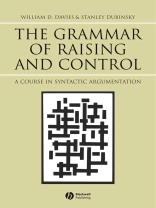The Grammar of Raising and Control surveys analyses across a range of theoretical frameworks from Rosenbaum’s classic Standard Theory analysis (1967) to current proposals within the Minimalist Program, and provides readers with a critical understanding of these, helping them in the process to develop keen insights into the strengths and weaknesses of syntactic arguments in general.
- Distills a very successful graduate course in syntax from two prominent figures in the field, covering analyses from a range of theoretical frameworks.
- Provides readers with an understanding of the various perspectives represented in generative syntax, using a particular class of grammatical constructions as a means of examining the evolution of syntactic theory over the last thirty years.
- Helps students to develop keen insights into the strengths and weaknesses of syntactic arguments.
- Includes excerpts from six important works that allow students to familiarize themselves with the original literature while also providing discussion of the theoretical context in which they were written.
สารบัญ
Acknowledgments.
Preface.
Part I: Classical Transformational Grammar: Laying the groundwork:.
Introduction: Building the foundations of a syntactic analysis.
1. Laying the empirical groundwork.
2. Transformational Grammar and Rosenbaum’s analysis.
3. Postal’s On Raising.
Excerpt from Postal 1974.
4. Extended Standard Theory: Chomsky’s Conditions on Transformations.
Excerpt from Chomsky 1973.
5. The On Raising Debates: Bresnan, Postal, and Bach.
Part II: Extensions and Reinterpretations of Standard Theory:.
Introduction: Branching paths of inquiry.
6. Relational Grammar” Perlmutter and Postal’s The Relational Succession Law.
Excerpt from Permutter & Postal 1972/83.
7. Revised Extended Standard Theory: Chomsky and Lasnik’s Filters and Control.
Excerpt from Chomsky & Lasnik 1977.
Part III: Government & Binding Theory:.
Introduction: The interaction of principles and possible analyses.
8. Chomsky’s Lectures on Government & Binding and the ECM analysis of Raising.
9. Development of and problems for the ECM account: Kayne 1981 and Cole & Hermon 1981.
Excerpt from Cole & Hermon 1981.
10. Are all these really raising constructions?: Cross-linguistic issues.
Part IV: The Minimalist Program:.
Introduction: Neo-Raising, Neo-ECM, and the Raising/Control distinction.
11. Functional projections and the rise of the Minimalist Program.
12. The return to a Raising to Object analysis.
Excerpt from Lasnik & Saito 1991.
13. The separation/unification of Raising/Control.
References.
Index
เกี่ยวกับผู้แต่ง
William D. Davies is Professor of Linguistics at the University of Iowa and is author of Choctaw Verb Agreement and Universal Grammar (1986).
Stanley Dubinsky is Associate Professor of Linguistics at the University of South Carolina. He is co-editor of Objects and Other Subjects: Grammatical Functions, Functional Categories, and Configurationality (with William D. Davies, 2001).












